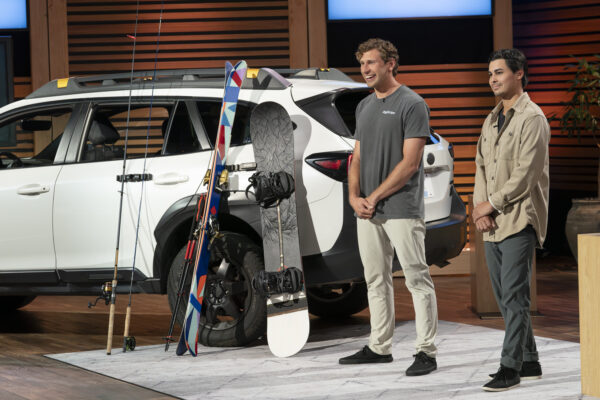
Steven Graf (left), Zhach Pham at their startup RigStrips on the TV show “Shark Tank” in 2024.
Steven Graf and Zhach Pham were business partners from a young age.
The two best friends met in second grade in their hometown of Westport, Connecticut and ran a lemonade stand, built go-karts and dug for buried treasure — to their parents’ consternation — in the backyard.
“We were always making things,” said Pham.
Decades later, they had their breakthrough.
On an episode that aired Friday, the pair went into CNBC’s Shark Tank and left with a $300,000 investment in their company, Denver-based RigStrips.
The pair’s main product is a magnetic car mount called the SnoStrip that protects skis, snowboards and car exteriors by giving gear a space to slot into. It attaches to the side of a car and helps avoid scraping and drop damage that can come when leaning equipment on a vehicle. RigStrips also sells the SunStrip, which does the same, but for fishing poles and other warm-weather outdoor products.
“We both grew up skiing, and this is a product we knew we would use,” Pham said.
Skiing brought Pham to Colorado College in 2011. After graduation, he moved to Denver; Graf joined him here soon after.
After a long day on the slopes in 2019, Pham plotted their next project over a beer in RiNo. On the back of a receipt, he drew a concept and wrote “Ski strip.” Months later, RigStrips was born.
The original SnoStrip was more of a bumper sticker, attaching to cars via adhesive on the back. But after customer feedback, the pair tweaked it to magnetic so that it could easily be taken on and off.
With the newfound flexibility, RigStrips launched the SunStrip soon after to meet the demand of summer sports. They have design and trademark patents for both products.
I four years, they have sold more than 60,000 units and ticked past $3 million in sales.
The friends are shooting for revenue of $2.7 million this year, and their newfound capital will ensure they’ll have the stock as RigStrips’ busy season begins. They do 62 percent of their sales during November and December, Graf said on the show.
Both the SnoStrip and SunStrip sell for around $50 and cost around $8 to make. The company’s profit last year was $450,000.
Todd Graves, owner and founder of the Raising Cane’s Chicken Finger empire, was the shark who gave the cash in exchange for a 15 percent stake in Rigstrips. Pham and Graf’s original ask was $300,000 for 7.5 percent of the business.
“Todd was pretty much the reason we were on the show,” Pham said.
The business plans to spend $250,000 to boost inventory and use the other $50,000 to advertise to become a “brand name in the outdoor sports space,” Graf said. This is the first major investment for the company, and the first since the two each put in $5,000 of their own money when starting the business.
“Whatever we can do to grow faster and get the product into people’s hands,” he said.
One of the things that excites both him and Pham is Raising Cane’s Louisiana State University tailgating roots. RigStrips also sells other products, such as a mat for keeping feet off the ground when changing in and out of boots. The two hope to make their company an end-of-the-ski-day staple.
“There’s that element of tailgating with RigStrips … having a beer at the end of the day … and Cane’s having roots in tailgating is something we hope to blend,” Graf said.

